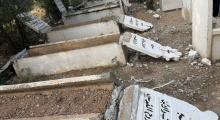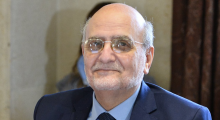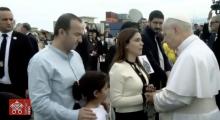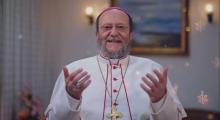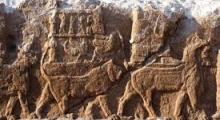Issued by the Catholic Center for Studies and Media - Jordan. Editor-in-chief Fr. Rif'at Bader - موقع أبونا abouna.org
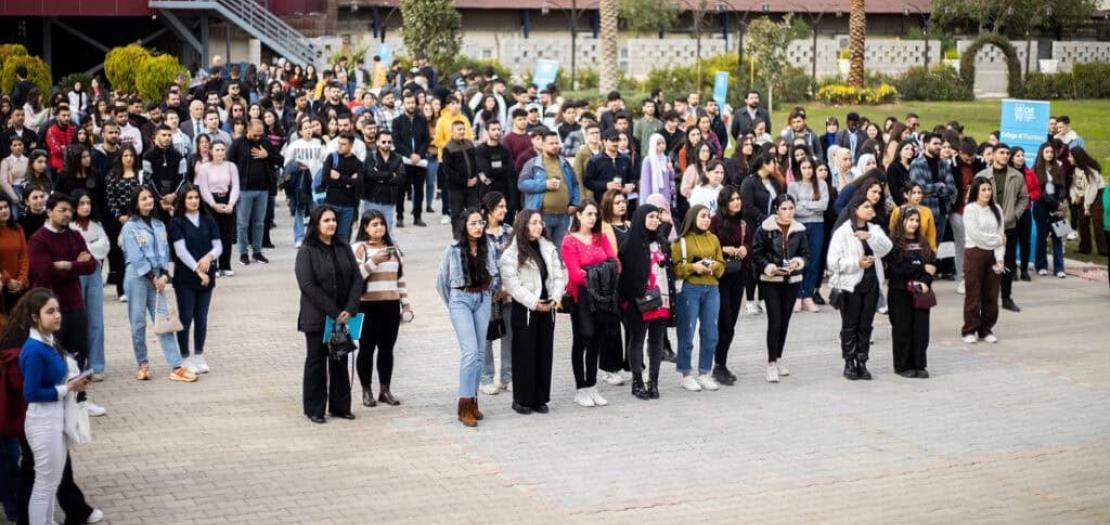
On December 8, 2015, in a city in northern Iraq, 11 students began taking classes in a new university, born amid terror, war, and fear – and one of the most dramatic persecutions of Christians to be seen in modern times.
The name of the new institution was The Catholic University in Erbil (CUE). Its initial enrollment of 11 doesn’t sound like much, but for Iraqi Christians, it was a new, promising beginning. Its founding was a statement of hope — indicating that the Faith’s disappearance from the Middle East was not inevitable.
Over the past decade, CUE has grown to accommodate some 750 students who can choose among 16 disciplines in which to specialize. On September 30, as the school graduates its fifth class, the university community will come together to give thanks, reflect on its accomplishments, and look to the future.
Archbishop Bashar Matti Warda, head of the Chaldean Archdiocese of Erbil and founder of CUE, spoke with Aid to the Church in Need-USA about the educational venture and what it means for the Christian community of Iraq.
Your Grace, the Catholic University of Erbil started during the ISIS invasion. Take us back to what it was like in those days.
The idea was always there as I knew, from my own formation, that education builds a strong community of faith that can stand firm in any storm. I fully understood that a university could be both a bridge to others and a chance to share Christ’s love with everyone—just like our Fathers in faith did long ago. That is why we laid the foundation stone in 2012.
With the shock of ISIS in 2014, the project became an urgent pastoral duty and obligation of care when thousands of families were forced to leave Mosul and the Nineveh Plain. Apart from pastoral and humanitarian care, we needed to continue their lost education. Our educational response was “a project of life, not a project to leave Iraq.” We needed to give the IDPs a chance to continue their higher education in a safe and welcoming place of learning that protects dignity and secures a future in Iraq and not in the diaspora. If parents know their children will be educated, then they are more likely to remain in Iraq. This has since been proven by most of our graduates and the growth of the university from 11 in 2015 to now with over 760 students.
In 2015, the university opened. All subjects are taught in English as this equips the students to be more successful in the job market. Year after year its meaning has grown: every student’s story matters to us, and from these stories we draw our present and future.
Today the university is clearly a huge signpost for Christians as a platform that gives hope where there was once little hope. We tell our story without noise, a quiet space where every student can breathe and find in us the breath of Christ—witnessing through equality for all, respect, hard and honest work, and deep love for every person’s freedom. It is really the only higher educational platform in Iraq where there is this joyful co-existence, where everyone, no matter their faith, is truly valued and respected. It is a seed that will grow within the work world with the alumni who have shared very special years in a learning environment where everyone is equal and understanding and respectful of the faith of the other. This is a unique project in higher education in Iraq to keep Christianity in Iraq; without the university families will head to the diaspora.
How has the campus developed over 10 years, and what does it include today?
The great teaching facilities, despite the initial basic academic buildings and classrooms, grew as more students came. Today, the campus has colleges of Pharmacy, Nursing, Medical Laboratories, Engineering/Architecture, Accounting, Business and Economics, IT, Languages, Media/International Relations, and Eastern Studies.
There are specialized labs, a magnificent library with study halls, and an auditorium. This year we are also preparing a chapel and a prayer room for Muslim students, because the campus must be a safe crossing for anyone who sincerely seeks God. We also have green spaces, sports areas, and full student services. The growth was step by step, but we never lost the place’s identity: a place that teaches, listens, and forms in the Catholic faith.
Where do the students come from, and why do they choose CUE?
They come from Erbil, Duhok, Sulaymaniyah, the Nineveh Plain, Baghdad, Babylon, and from Christian, Muslim, Yazidi, and other families.
They choose CUE because it is safe and welcoming environment where 60% of the students are Christian. In any other university in Iraq, students would be 98% Muslim.
CUE campus life is unique for students compared to many other universities because of its strong emphasis on diversity, respect, and opportunities. Students from diverse religions and ethnic backgrounds study together, fostering an understanding and appreciation of other cultures.
They also choose us because we care for every individual. To give even more attention to each student’s journey, we established an office for accompaniment and guidance, where Fr. Ephrem Azar, a Dominican, is always present, close to both students and staff, listening to their aspirations and the challenges they face. His presence has greatly contributed to the warm and positive atmosphere at the university.
The same can be said by having the Dominican Sisters teaching and on campus.
The Archdiocese of Rottenburg-Stuttgart, Germany, provided us three years ago with a counsellor for ISIS-traumatized students; He really achieved great things and supported the Yazidi students whose families and communities suffered most from ISIS.
What can CUE do for Iraq? What is it doing now for society?
If we disappear from Iraq, apart from who would be the voice of Jesus in this ancient land, you will lose a pluralistic society, one that keeps check on the other to have a good balance in a country. No matter how small, we are known as voices of love, peace education, healthcare and being a trusted people. Those are high values in any small community and should never be lost.
Apart from creating 1,200 new jobs for Christians, we also benefit the economy of the local communities. Students provide tangible economic benefits to local businesses through their consumer spending on everyday needs and services. As the university expands, so do the local businesses.
Through education, the graduates want to stay to become leaders to help rebuild this nation with their professional training, critical thinking, perseverance, coexistence and the ability to understand and appreciate the differences of the other.
A few of our graduates are now working for international humanitarian agencies in Iraq, giving them the benefit of the English language skills and local knowledge.
Historically, Christians have provided education and healthcare. We run a nursing program and hope in time to have a small medical school to feed into the Maryamana Hospital, which is owned by the archdiocese. It was praised by the Ministry of Health during the Covid pandemic in providing care to people of all faiths.
Step by step, we are learning how to be a Catholic university in a society wounded by wars and displacement. Our mission is to form leaders with responsibility and skills. We reduce loss of opportunities for our young with scholarships to produce graduate professionals for business, health and technology needs. We run community service projects, health campaigns, youth training, awareness meetings, and dialogue initiatives.
We run evening classes for adult education within the community. We also held two major conferences on Personal Status Law (2024) and on Church Property Law, with wide Church and state support. The campus has become a laboratory of citizenship. Most of all, it is a place that keeps the story of faith alive, where people breathe Christ through equality, respect, dignity, and service.
How was CUE part of the Christian community’s efforts to simply survive in Iraq?
We gave people what they needed to survive with dignity: quality education, safety, and hope. A scholarship for one displaced child often meant survival for a whole family, and a way to rebuild. The university secured our presence not with slogans, but with real knowledge and daily service. We added theology and Bible courses, prayer camps, and programs that stayed with young people even when they returned home. Our answer to displacement was a project of life: a university seat that kept families together and gave them tomorrow. Survival comes not from fear but from education that creates hope. It had to be free education as ISIS crippled the livelihoods of Christians; it is hard enough to house, cloth and feed your children let alone pay tuition fees.
Finally, Your Grace, how would you describe the help of Aid to the Church in Need (ACN)? What has it allowed you to achieve?
ACN has been, and still is, a true partner in mission. They supported the university from the time it was just an idea; they helped build a wing of the university, equip halls and medical labs, supported the initial running costs, gave scholarships to students displaced by war. They later equipped the library with computers. After the visit of Pope Francis, we asked for support of scholarships to keep the young in Iraq as their parents had lost so much with ISIS. They had no money to support their children’s education; if they could not be educated, they would head to the diaspora. We appealed to ACN, and they fully recognized the need and opportunity to keep Christianity in Iraq; we jointly launched the “Pope Francis Scholarships” to give life and hope to the poorest young people. ACN also supports accommodation for the poorest families living outside of Erbil, as they cannot afford to pay for housing in Ankawa.
Thanks to this, hundreds of young people have turned the “possibility of study” into real education. At this year’s graduation, ACN’s first scholarship students will graduate; all 104 of them out of a total of 114 graduating here today. What a gift they have been to displaced Christians and our university. ACN supported more in the following years as ACN now has four Pope Francis Scholarship programs running with the university. It will be a fantastic moment for these first graduates as every scholarship defines hope, is a call to life, a great formation, every classroom a silent prayer in nurturing success.
But their help went further: ACN’s financial and moral support allowed us to keep going, to manage our budgets wisely, and to grow in a prudent but proactive way. With more scholarships, more students came, and their very presence became the best witness and promotion of the university. Students of all religions and backgrounds knocked on our doors, and the campus became a small picture of a diverse Iraq. Tuition fees set by the Ministry of Higher Education and Scientific Research and the fall of the Iraqi Dinar to the US Dollar made it challenging in competing with other private universities and free education at the public universities. As the student numbers increased, we are starting to turn the corner and eroding the cumulative yearly losses.
Now we can say with confidence that within two years, we could reach a good level of financial sustainability.
ACN’s support was not only money; it was an immense bridge to succeed in this mission to keep Christianity in Iraq. ACN has allowed us to find our way through financial difficulties and a way to keep the university as a vital and key platform to tell our story, show our identity, and protect every student’s dignity and hope for a future in Iraq by being well qualified for the job market, with the extra advantage of being English speakers and writers.


